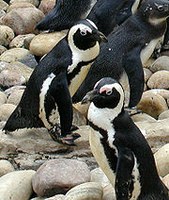African Penguin populations, living on the southern African coast, have declined from 2 million pairs in the mid-19th century to only 25,000 pairs today, says Phil Hockey, director of South Africa’s Centre of Excellence in 'Birds as Keys to Biodiversity Conservation', at the Percy FitzPatrick Institute of African Ornithology, University of Cape Town.
Hockey explained that African Penguins (Spheniscus demersus), also known as Black-footed Penguins, have taken four "hits" over the past 150 years. In the mid-19th century, the removal of millions of tons of phosphate-rich guano, for the production of fertilizer, destroyed large areas of the penguins’ nesting habitat. Burrows in the soft, guano-covered landscape had provided a sheltered habitat for the birds to breed. With the guano stripped away, the birds' eggs were left exposed on the rocky surface, vulnerable to predators, heat and rain.
At the turn of the 19th century and during the first decades of the 20th, the commercial harvesting of hundreds of thousands of penguin eggs each year, primarily as a cheap food source, placed additional pressure on the penguin population. Some 50 years later, in the 1960s and 1970s, overfishing reduced the penguins’ food supply. More recently, a yet-to-be-explained eastward migration of sardines, a key food resource for the penguins, has reduced their numbers even more.
This year, the South African government established a 20-kilometre 'no-fishing' zone around St. Croix Island in Algoa Bay, the site of a penguin breeding colony. Researchers are now following the foraging behaviour of the penguins there, using underwater tracking devices to see if they are travelling shorter distances for feeding, thanks to the ban.
"Preliminary results are encouraging", Hockey says. Yet, he admits that the project is "an experiment". Additional studies will be needed, he says, before it can be determined whether the localized fishing ban has been effective.
If such measures fall short of their goals, then more stringent steps – such as placing more restrictive quotas on fish catches – will need to be considered. Such steps, Hockey notes, will likely spur fierce opposition from commercial fishermen, who will fear a loss in income.
The 150-year decline in African Penguin populations is now putting their survival at risk. "If we fail to find effective conservation measures, and current trends continue, the species could be facing extinction within three or four decades", he says.
The Percy FitzPatrick Institute – which will celebrate its 50th anniversary next year – is one of only a handful of research centres of its kind in the world. Other centres devoted to bird research include Cornell University’s Laboratory of Ornithology in the USA and Edward Grey Institute at Oxford University in the UK. With a staff of 10, including five researchers, and 60 postgraduate students and postdoctoral fellows, the Percy FitzPatrick Institute addresses a range of ornithological research challenges, including the potential impact of climate change on bird habitats and health, bird migrations and coastal and seabed conservation.
For additional information about the Percy FitzPatrick Institute and its work, see www.fitzpatrick.uct.ac.za.


